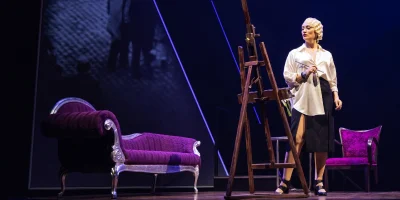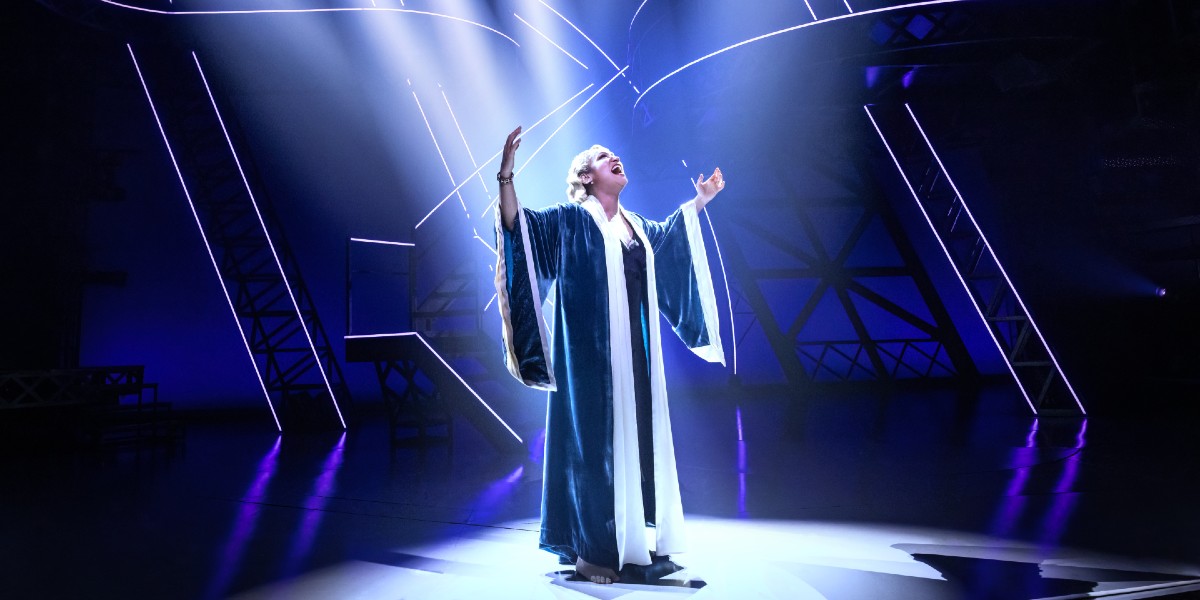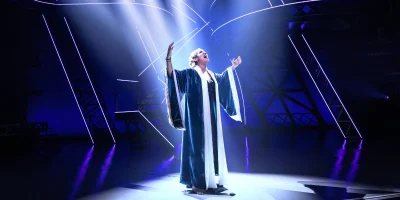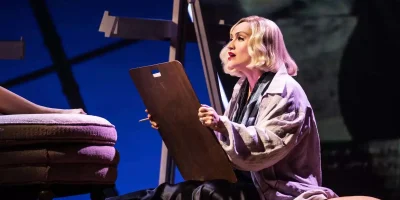
Eden Espinosa plays an unapologetic, complex woman in ‘Lempicka’ on Broadway
The 2024 Tony Award nominee shares why she pursued the role of celebrated artist Tamara de Lempicka for a decade and what she learned in the process.
The last time Eden Espinosa was on Broadway was in 2008, playing Maureen in the closing company of Rent. Now, 16 years later, she's returned to lead the new musical Lempicka as the title character: the complicated, celebrated artist Tamara de Lempicka.
“There's no roles like this for women my age, that do this whole thing,” says Espinosa, 46, who starts the show as an old woman and then chronicles her entire journey from her origins as an artist in Paris through her tumultuous relationships and beyond. “It's the hardest thing I've ever done… I’ve never been pushed beyond my limits like this before, and we'll see how I come out of it at the end.”
She’s come out with her first Tony Award nomination for Best Leading Actress in a Musical, a fitting capstone for her decade-long journey with the show, which includes pre-Broadway productions at the Williamstown Theatre Festival in Massachusetts and the La Jolla Playhouse in California. But Espinosa didn’t originally play Lempicka in the first workshop she did in 2014; she played Rafaela, the artist’s lover now played by Amber Iman (who also earned a Tony nod).
Espinosa says it was a “fight” to get the title part, which has several parallels to her past characters, like Maureen and Elphaba in Wicked. Espinosa made her Broadway debut as the standby for the green witch and went on to perform on Wicked's first national tour, on Broadway, and in the original Los Angeles company.
“I always want to find the human aspect and have compassion for my characters and never judge them,” Espinosa says. “They’re all a little bit flawed and human. I think there are definitely similarities, besides singing high!”
As Lempicka prepares to close on May 19 and the Tony Awards approach on June 16, Espinosa reflects on return to Broadway, the importance of portraying complicated women, and why this show spoke to audiences.
You’ve been developing this show for almost 10 years. What was your journey to being cast as Lempicka?
I stepped in at the last minute for a presentation at the NAMT Festival (National Alliance of Musical Theatre) because somebody got sick. [Composer] Matt [Gould] called me and was like, “Do you think you can do it?” Because he knew I was listening to his demos all the time. I stepped in with three days' rehearsal, and that was the first time I played the role. And they got commercial producer interest through that presentation.
But with that, [the producers] have a say and they wanted to see if they could find a bigger name, which they did for one workshop and that bigger name went on to do bigger things. That's when they were preparing the Williamstown production, and [director] Rachel [Chavkin] had just gotten involved as well, so I had to re-audition three times. And then I got the part and it's been mine every since.
How has your time away from Broadway helped prepare you for this moment?
I've developed a thicker skin when it comes to opinions about the pieces that I'm involved in and knowing the things that I'm drawn to aren't for everybody, and that's okay. That’s what we do, and that's what art is.
I really have been able to take risks and try things and become the artist I am today through those years. I took risks of, “I want to do that piece that doesn't pay me any money and I have to be out of town for three months.” Lempicka, over the years, has definitely been one of those pieces.
Were you familiar with Lempicka's story at all before doing the show?
No. It's one of those things that happens with a lot of people, that you don't really know the name, and then you see some of the paintings and you go, “Oh my gosh, I've seen that!” I recognized them for sure from Madonna videos, but I didn't know her story by any means until this musical.
What was research did you do for the role?
I didn't start doing research on her until after Williamstown and after I had met her great-granddaughter Marissa. While it was fascinating to learn, it ended up being just more confusing and not helpful for our world. There were a lot of different versions of truth that she told people to conceal things, to survive, to get into certain circles.
It wasn't proving helpful but the fact that she did that was helpful… The essence of her spirit, her mind, the way that she saw things, the way she maneuvered through spaces, the lies that she told — those types of things were helpful for me creating my version of her.

How does it feel to play someone who not everyone might like? Lempicka is a complex woman, and we don’t see many characters like her in lead roles on stage.
It's been harder in other iterations, because once we started doing productions, you can read energies in the audience, and you can feel when they're on your side. And there have been times where it has not felt good because I'm like, “They don't like her." Or they're not with her.
It’s fascinating this time around since I've let go of a little of that need to be liked as a character. But she's a human, she is a fully rounded, messy, complicated, nuanced human.
It's interesting, also, the season and the reviews and a woman at the center of it. If this was Tadeusz [Lempicka’s husband] instead of Tamara and he was at the center of it, it would be a completely different thing. The audiences are really responding to what we've created and connecting to it in a gorgeous way, and it’s making them think and feel. It just goes to show what certain people are ready for and what certain people aren't.
It’s also rare to see a queer woman at the center of a story — what does it mean to you to play queer characters? you have that experience with Maureen in Rent.
It's a huge responsibility because we don't see it… [Queerness] is actually the center of the story, and we don't shy away from showing the physicality. It’s an honor. I have been in the audience and have seen straight people in relationships [in other shows] and gone, "I don't buy it." And I never wanted that to be a thing — even when I did Rent. Even moreso now. I love that Amber [Iman] and I both hold it in very high regard because it's important.
And even for Tamara being bisexual, it's also important to show that these feelings and the complexities of them are real. People have this struggle and people have this conflict of: I want both, equally for different reasons. That's been beautiful to portray.
Do you relate to her story at all as an artist?
What I'm starting to relate to now is [unapologetically] saying what it is that you want to do and going after what it is you want. The rest of it is out of your control, but showing up in your full capacity and taking up space is the big lesson of this iteration for me.
What do you hope audiences take away from the show?
What I want most of all is for people to be moved. We have people who have come 17 times. They say this show is their safe space.
I want them to look at this woman and to look at this piece and everything that it offers and be moved and think about their life. I want them to leave a bigger human.
Photo credit: Eden Espinosa in Lempicka on Broadway. (Photos by by Matthew Murphy and Evan Zimmerman)
Frequently asked questions
What is Lempicka on Broadway about?
Tony Award-winning director Rachel Chavkin teams up with a fresh writing duo to repaint the life and legacy of Tamara de Lempicka. Discover how this real-life Polish painter went from a refugee to a trailblazing, renowned figure in Parisian society, battling personal and political conflict to make her mark.
Where is Lempicka on Broadway playing?
Lempicka on Broadway is playing at Longacre Theatre. The theatre is located at 220 West 48th Street (between Broadway and 8th Avenue), New York, 10036.
How long is Lempicka on Broadway?
The running time of Lempicka on Broadway is 2hr 30min. Incl. 1 intermission.
What's the age requirement for Lempicka on Broadway?
The recommended age for Lempicka on Broadway is Ages 12+. Children under 4 are not permitted in the theatre..
How do you book tickets for Lempicka on Broadway?
Book tickets for Lempicka on Broadway on New York Theatre Guide.
Who wrote Lempicka?
Carson Kreitzer (book, lyrics, concept) and Matt Gould (book, music) wrote Lempicka, the duo's first Broadway musical.
Who directed Lempicka?
Rachel Chavkin directs Lempicka. She is best known for directing the eight-time Tony-winning musical Hadestown.
What are the songs in Lempicka?
The songs in Lempicka include “Woman Is,” “L’Amour Fou,” “Stillness,” and “What She Sees.” Carson Kreitzer wrote the lyrics, and Matt Gould wrote the music.
Is Lempicka appropriate for kids?
Lempicka is recommended for ages 13 and older because the show has some adult themes and content, including acts of violence. Please note that children 4 and younger are not permitted in Broadway theatres.
Is Lempicka good?
Yes — Lempicka boasts amazing vocal and acting talent and a powerful feminist story. Fans of older Broadway blockbusters such as Evita and Les Misérables, which are period shows covering decades of political struggles through a moving and human lens, will enjoy this musical.
Originally published on




